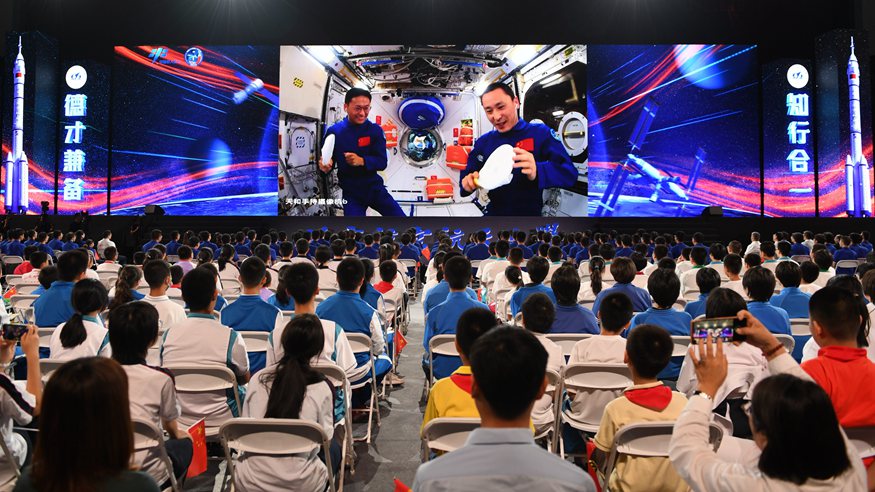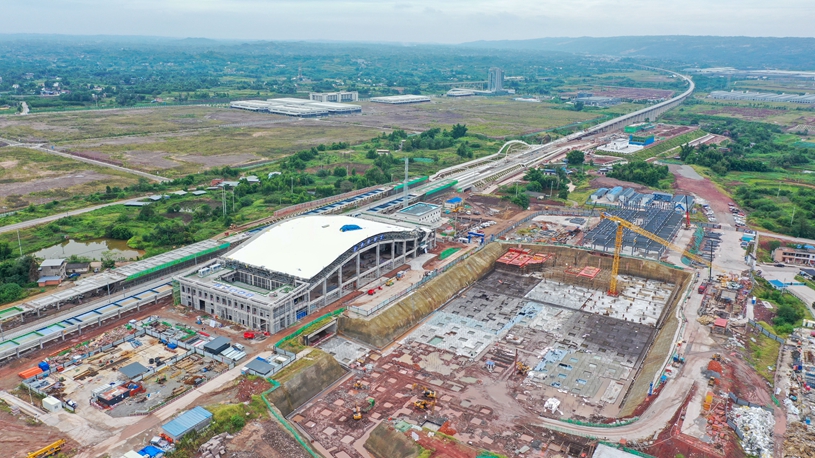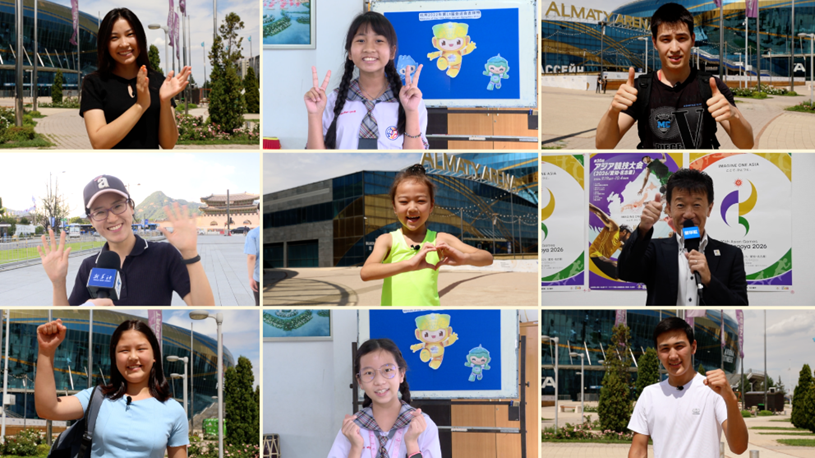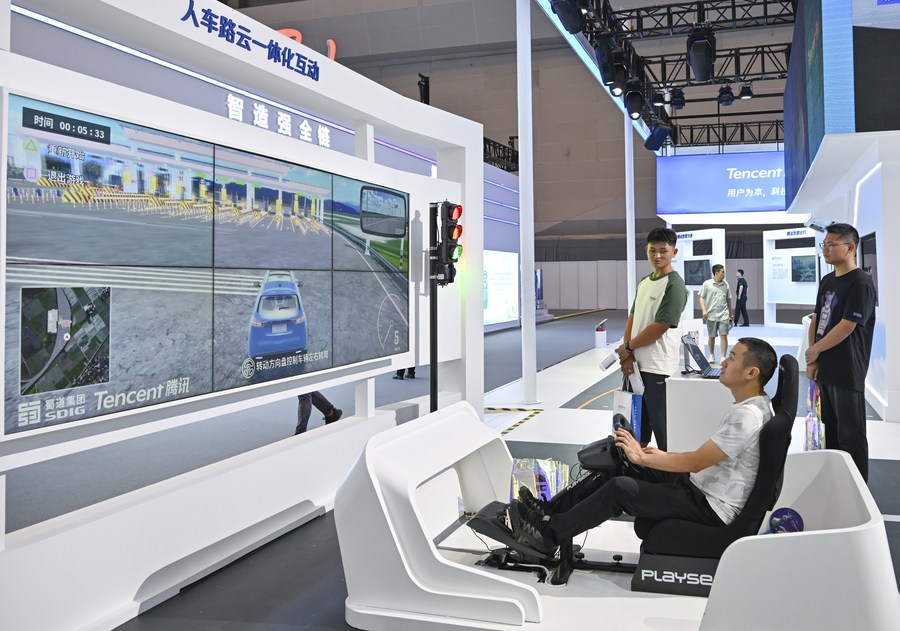
A visitor operates a people-vehicle-road-cloud integration system at the booth of Tencent during the Smart China Expo 2023 in southwest China's Chongqing Municipality, Sept. 4, 2023. (Xinhua/Wang Quanchao)
JINAN, Sept. 22 (Xinhua) -- In China's pursuit of high-quality development, more enterprises are doubling down on their intellectual property (IP) efforts in a bid to increase competitiveness, unleash innovation vitality, and achieve sustained profit growth.
Speaking at the 12th China Intellectual Property Annual Conference held this week, Tencent's vice president Jiang Bo said the company has spent more than 180 billion yuan (about 25.09 billion U.S. dollars) on research and development since 2020. Tencent is placed second among global internet companies in terms of the number of patents it has applied for and been granted.
He added that the company had strong patent advantages, especially in some cutting-edge fields, such as cloud computing, big data, artificial intelligence (AI) software, and internet security services.
Patents have also helped Tencent generate revenue, as it has shared carbon-neutral-related technologies through patent open licenses. Jiang used a math metaphor to describe the tech giant's return on IP investment, saying that "if sci-tech innovation is considered an addition, IP would be a multiplication, and using the multiplication effect can create sustainable social value."
His opinions were echoed by Zeng Chen, vice president of e-commerce giant JD.com, who believes IP is one of the most potent tools for enterprises to use in seeking market growth.
In Zeng's speech, he highlighted that the company has attached great importance to innovation, with more than 1,000 scientific research papers published in top international journals. It has also offered IP training and services for sellers operating on its online retail platform.
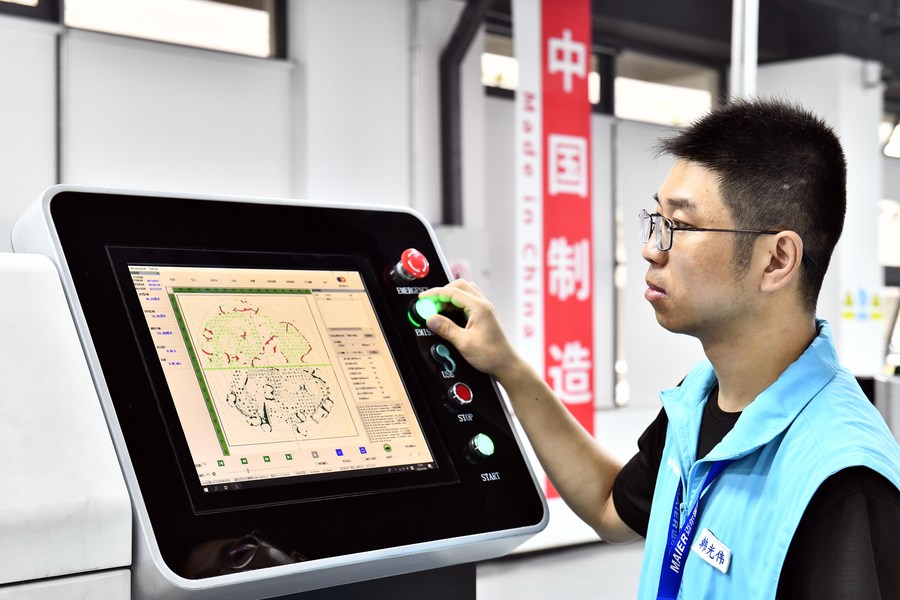
A staff member operates a machine to make dentures at an industrial park in Rizhao Hi-Tech Industrial Development Zone of Rizhao City, east China's Shandong Province, June 29, 2023.(Xinhua/Guo Xulei)
Traditional sectors are also very eager for innovation. Facing emissions-reduction pressure, many iron and steel companies are exploring a greener development path through IP support. Shandong Taishan Steel Group Co., Ltd. is one of them.
Chen Peidun, deputy general manager of the company, shared some IP strategies at the conference, including rewarding employees for sci-tech contributions, enhancing talent cultivation, and pushing forward patent transfers for industrialization. Together with the University of Science and Technology Beijing, Taishan has developed a method for resource utilization of carbon dioxide, which won a top world steel industry tech award.
"The innovative power of IP is the most effective way to improve the core competitiveness of enterprises and even the whole industry," Chen said.
Huawei is a large patent holder with an ownership of over 120,000 patents worldwide. Shen Hongfei, vice president of the company's Legal Affairs Department, cited a group of data to show the positive cycle of Huawei's innovation. Shen pointed out that in 2022 alone, the company's R&D investment reached 161.5 billion yuan, accounting for a quarter of its sales revenue, while the revenue generated by patent licensing last year was 560 million U.S. dollars, with the rewards reinvested in next-generation inventions.

A robot performs shooting at the basket during the World Artificial Intelligence Conference 2023 in Shanghai, east China, July 6, 2023. (Xinhua/Fang Zhe)
Attendees of the conference also shared their views on IP protection concerning new fields and emerging industries.
Can AI be a patent inventor? Liu Zhaohui, vice president and chief editor of 360 Technology Co., Ltd. posed this question while talking about his company's newly launched human-like AI model at the conference.
Many countries' patent offices and courts have found that AI-generated inventions are not patentable, as the patent system assumes that inventors are human, but Liu called for careful consideration of the creativity and originality of large model systems.
"We need to assess the creative contribution of natural persons in Al-generated content in the fields of literature, art, and scientific research, and distinguish between works created by natural persons and those created in collaboration with Al," Liu said.
This view was shared by many entrepreneurs attending the conference, including Liang Zhixiang, vice president of search giant Baidu, also a pioneer in AI models. During his keynote speech, Liang suggested explorations of a new legal framework adapted to the age of AI, with more flexible and adaptable policies to seek a balance between innovation and IP regulation.
The good news is that IP protection rules concerning new fields and emerging industries, including AI, big data, and blockchain, have been put on the nation's agenda. The National Intellectual Property Agency said earlier this month that it has revised examination standards, expanding the patent scope and providing higher examination quality and efficiency. ■



